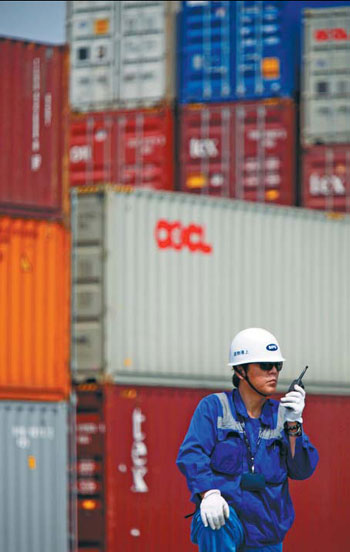Rough seas for shippers expected to last for years
Updated: 2011-11-04 13:54
By Zhou Siyu (China Daily)
|
|||||||||||
|
The Yangshan deep water port in Shanghai. The shipping industry is facing problems such as overcapacity and surging oil costs, said industry leaders and officials. [Photo/ Bloomberg] |
BO'AO, Hainan - A lack of political consensus to achieve balanced global economic growth is making 2011 "the most painful" year for the already troubled shipping industry, said Wei Jiafu, chairman of China Ocean Shipping (Group) Co, China's largest State-owned shipping conglomerate.
This year has brought gloomy prospects for world economic recovery, as developed economies struggle with debt woes and high unemployment, while emerging markets are battling high inflation.
The global trade volume is still growing. But demand in the United States and Europe is expected to be low, which is likely to bring down the growth rate in the market.
The Baltic Dry Index, a benchmark for commodity shipping costs, has registered a 27 percent decline in the past year.
"There is still no political willingness to be seen (among world leaders) in addressing these problems," Wei said.
"This is making the year even more difficult (for the shipping industry) than during the global financial recession.
"Governments around the world responded immediately to save the markets during the crisis, but now they are making different policies serving their own interests," he added.
Wei was speaking at the World Shipping (China) Summit in Bo'ao, in South China's Hainan province, on Thursday. His comments came just days after Greece announced it would hold a referendum on whether to accept a bailout plan put forth by European leaders.
Dong Tao, managing director and chief regional economist for Asia excluding Japan at Credit Suisse SA, said the debt crisis in Europe is likely to worsen, affecting the banking system in Europe.
"The bailout plan needs to focus on stabilizing the market and improving financial structures in the debt-stricken countries," he said. "For the next few years, consumption will decline globally, leading to more risks for the financial sector."
The shipping industry also faces other problems, such as overcapacity and surging oil costs, said industry leaders and officials.
"Overcapacity in the industry can be traced back to 2002, when the business was booming and shipping companies won lots of orders," Transport Minister Li Shenglin said at the summit.
The shipping industry is being pressured by the excessive tonnage and depressed freight rates and the current market downturn might last for a "relatively long" period, he said.
"We exert moderate and orderly control in putting new container and dry-bulk ships into the market," the minister added.
But the market will eventually recover after a decline of several years, and China's robust growth in economy and demand may serve as a major engine, said analysts and companies.
"China is gradually tapping into its domestic consumption. The country's deepening process of urbanization is good news for the global market, especially bulk commodities," said Tao from Credit Suisse.
Under the 12th Five-Year Plan (2010-2015), China will focus on "upgrading its economic structure and securing quality growth", and will encourage companies to move up the value chain.
"From a container business perspective, this means less business in the next few years compared with the situation if China were simply a world exporter," said Soren Karas, vice-president of Maersk Line North Asia Region, a division of Copenhagen-based AP Moller-Maersk Group, the world's largest shipping company by capacity.
"Although China's trade growth may not be as radical as a few years ago, it will remain very robust," he said. "We are very positive about China's economic growth."











